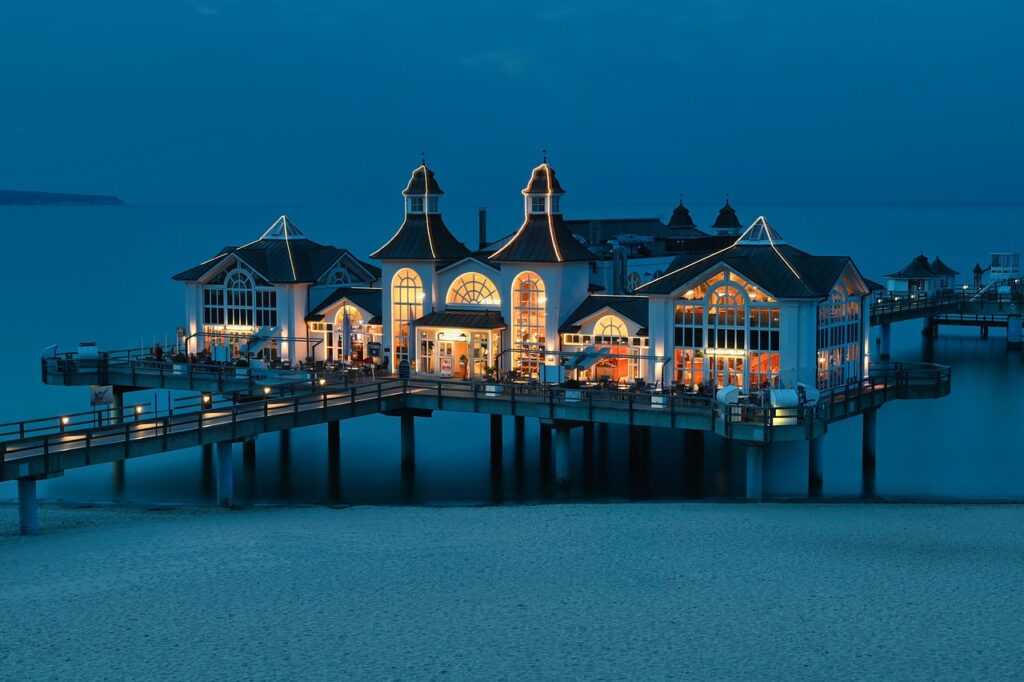Historical Perspective Of Casinos In Entertainment
Casinos date back to the 17th century in Europe, specifically in Italy, where the first known casino, “Ridotto,” opened in Venice in 1638. This establishment aimed to provide a controlled gambling environment, attracting the elite and ensuring state revenue.
By the 19th century, casinos had spread across Europe and the United States. Notable examples include the establishment of famous casinos in Monaco, like the Monte Carlo Casino, which opened in 1863. These venues gained prominence not just for gambling but also for their architecture, events, and social gatherings.
In the early 20th century, Las Vegas emerged as the epicenter of casino entertainment in the United States, starting with the legalization of gambling in Nevada in 1931. Las Vegas casinos, such as El Rancho Vegas, opened in 1941, combining gambling with entertainment and hospitality.
Throughout the latter half of the 20th century and into the 21st century, casinos expanded their offerings to include a variety of attractions beyond gambling. This transition marked their role in the broader entertainment and tourism sectors. Las Vegas continued to lead, with the introduction of themed resorts and large-scale entertainment productions like Cirque du Soleil shows.
Historical records show casinos have continuously evolved, staying relevant by adapting to societal changes and tourist demands. From exclusive gambling halls in Venice to comprehensive resorts in Las Vegas and beyond, casinos have etched an indelible mark on global entertainment and tourism. Their historical journey underscores their significant role in how we experience leisure today.
Economic Impact Of Casinos
Casinos play a significant role in boosting local economies. They offer several advantages affecting multiple sectors within a community.
Employment Opportunities
Casinos create numerous jobs. They employ a diverse workforce, from dealers and security personnel to hospitality staff and entertainers. In Las Vegas alone, the casino industry supports over 370,000 jobs (Statista, 2021). These jobs span various skill levels, providing opportunities for both entry-level workers and highly skilled professionals.
Revenue Generation
Casinos contribute substantially to municipal and state revenues. They pay taxes on their earnings, which fund public services and infrastructure projects. For example, Nevada collected over $1 billion in gaming taxes in 2020 (Nevada Gaming Control Board, 2020). This revenue supports schools, roads, and healthcare, driving community development.
Boost To Related Industries
Casinos stimulate growth in related sectors. They attract tourists who spend money in hotels, restaurants, and retail stores. In 2019, visitors to Macau spent approximately $39 billion outside of gambling (Macau Government Tourism Office, 2019). This cross-industry spending boosts the local economy and creates additional employment opportunities.
Real Estate Development
Casinos often lead to real estate development. They spur the construction of hotels, resorts, and entertainment venues. In Atlantic City, the development of casino hotels transformed the city’s urban landscape, leading to increased property values.
Community Investment
Casino operators invest in local communities. They fund educational programs, sponsor events, and support nonprofits. MGM Resorts, for instance, donated over $75 million to community initiatives in 2019 (MGM Resorts International, 2019).
Tourism Enhancement
Casinos enhance tourism appeal. They attract tourists, boosting local tourism industries. Las Vegas, one of the world’s top casino destinations, welcomed over 42 million visitors in 2019 (Las Vegas Convention and Visitors Authority, 2019). These visitors contribute to the economy by spending on accommodations, entertainment, and dining.
Infrastructure Improvements
Revenue from casinos often funds infrastructure improvements. States and municipalities use casino-generated funds to upgrade public transportation, improve roads, and develop recreational facilities. For example, the Foxwoods Resort Casino in Connecticut contributed to the construction of new roads and bridges in the area.
Casinos impact local economies positively by creating jobs, generating significant revenue, and stimulating growth in multiple sectors.
Casino Tourism
Casino tourism is a major driver in the global travel industry, drawing enthusiasts from all corners of the world. It promotes not just gambling but a full spectrum of activities including dining, shopping, and entertainment.
Popular Casino Destinations
Popular casino destinations attract millions of visitors each year, boosting local economies.
- Las Vegas, USA: Known as the gambling capital, Las Vegas offers over 100 casinos, including iconic ones like Bellagio and MGM Grand.
- Macau, China: Often dubbed the “Gambling capital of the world,” Macau generates more gaming revenue than Las Vegas, featuring establishments like The Venetian Macao.
- Monte Carlo, Monaco: Home to the luxurious Monte Carlo Casino, it combines high-stakes gaming with an opulent lifestyle.
- Atlantic City, USA: Known for its boardwalk casinos such as Borgata and Caesars, it serves as a significant gaming hub on the East Coast.
Casino Tourism Trends
Casino tourism trends show a shift towards integrated resorts and experiential offerings.
- Integrated Resorts: Combining gambling with hotels, shopping, and entertainment, these resorts offer a comprehensive experience. For example, Singapore’s Marina Bay Sands.
- Online Gambling: The rise of online platforms has created a new segment within casino tourism, where players engage in virtual games.
- Sustainable Tourism: Casinos are adopting eco-friendly practices and supporting local communities to attract socially conscious travelers.
Casino tourism continues to evolve, impacting global travel and local economies profoundly. Each destination and trend shapes the future of both gambling and tourism industries.
Entertainment Offerings In Casinos

Casinos provide a vast array of entertainment options that go far beyond gambling. These options cater to diverse interests, ensuring every visitor finds something enjoyable.
Gaming Options
Casinos offer numerous gaming options, including slot machines, poker, blackjack, roulette, and baccarat. Slot machines are highly popular, with digital and traditional varieties. Poker rooms host tournaments and cash games, attracting both amateurs and professionals. Blackjack tables provide a mix of luck and strategy, making them a favorite among many visitors. Roulette and baccarat tables add elegance and excitement, often drawing crowds.
Shows And Live Performances
Shows and live performances are a staple in many casinos, featuring famous artists, comedians, and theatrical productions. Iconic venues like the Colosseum at Caesars Palace in Las Vegas host residencies by top performers. Visitors can also enjoy magic shows, acrobatics, and broadway-style productions. These high-quality performances enhance the overall entertainment experience, attracting a broad audience.
Dining And Nightlife
Casinos excel in offering diverse dining and nightlife options. Fine dining restaurants helmed by celebrity chefs provide gourmet experiences. Buffets serve a variety of international cuisines, catering to different tastes. Nightclubs and bars offer vibrant nightlife, featuring renowned DJs and entertainers. Lounges and cocktail bars provide a more relaxed atmosphere, perfect for unwinding after a day of gaming and shows.
Social Implications Of Casinos
Casinos play a significant role in shaping social dynamics within communities. It’s essential to understand both positive and negative aspects.
Gambling Addiction
Gambling addiction, also known as pathological gambling, affects individuals’ mental health and well-being. Studies show that about 1-3% of the adult population suffers from gambling addiction, leading to severe financial and emotional consequences.
Addicted individuals often experience debt, relationship issues, and job loss. Specialized treatment programs, such as cognitive-behavioral therapy and support groups like Gamblers Anonymous, help address these issues. Governments and casinos implement responsible gambling measures, including self-exclusion programs and public awareness campaigns, to mitigate addiction risks.
Community Effects
Communities hosting casinos experience varied effects. On the positive side, casinos create employment opportunities and boost local economies. According to the American Gaming Association, the casino industry supports over 1.8 million jobs in the U.S. Enhanced infrastructure, such as improved roads and public facilities, often follows casino development, benefiting residents.
However, the presence of casinos can also lead to increased crime rates and social disruptions. A study from the University of Nevada suggests that problem gambling correlates with higher rates of theft, domestic violence, and substance abuse. Balancing these effects requires careful regulation, community involvement, and continuous assessment of gambling impacts.
The Future Of Casinos
Casinos are evolving rapidly, leveraging technology and sustainability to enhance their appeal in the entertainment and tourism sectors. The future of casinos combines cutting-edge innovations with responsible practices.
Technological Innovations
Technological advancements are transforming casino operations and guest experiences. Online gambling platforms allow players to enjoy casino games from home, offering convenience and accessibility. Virtual reality (VR) casinos provide immersive experiences, making users feel like they’re in a physical casino. AI-driven analytics optimize gaming strategies and personalize marketing efforts.
Smart tables and slot machines enhance gameplay with touchscreens and cashless transactions. Blockchain technology ensures fair play by automating game mechanics and safeguarding transactions. Augmented reality (AR) enhances live dealer games, providing interactive elements that engage users in real time. By integrating these innovations, casinos attract tech-savvy tourists and diversify revenue streams.
Sustainable Practices
Sustainability is becoming a core focus for the casino industry. Green building certifications, such as LEED, ensure energy-efficient infrastructure. Solar panels and wind turbines reduce reliance on non-renewable resources. Casinos like the Las Vegas Sands incorporate eco-friendly designs, generating significant energy savings.
Water conservation practices, including low-flow fixtures and reclaimed water systems, minimize environmental impact. Sustainable food sourcing supports local agriculture and reduces carbon footprints. Waste reduction initiatives like recycling programs and composting decrease landfill contributions.
By adopting sustainable practices, casinos appeal to environmentally-conscious travelers and demonstrate a commitment to corporate responsibility. This shift attracts a diverse clientele, ensuring long-term growth and stability in the industry.



 Sienna Lyne
Author
Sienna Lyne is the talented author behind Bet Wise Daily's engaging and informative content. With a background in journalism and a keen interest in the gambling world, Sienna excels at crafting articles that are both insightful and accessible. Her work covers a wide range of topics, from the latest casino developments to in-depth features on gambling strategies. Sienna's meticulous research and sharp writing skills make her a valuable asset to the team, providing readers with trustworthy information and thought-provoking analysis.
Sienna Lyne
Author
Sienna Lyne is the talented author behind Bet Wise Daily's engaging and informative content. With a background in journalism and a keen interest in the gambling world, Sienna excels at crafting articles that are both insightful and accessible. Her work covers a wide range of topics, from the latest casino developments to in-depth features on gambling strategies. Sienna's meticulous research and sharp writing skills make her a valuable asset to the team, providing readers with trustworthy information and thought-provoking analysis.
